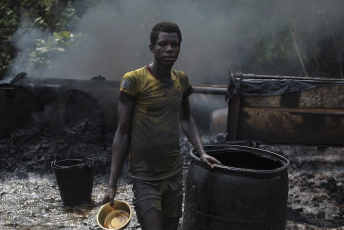Nigerian pirates kidnapped two government officials in Idabato, a Cameroonian border town in the Bakassi Peninsula, on 1 October 2024. One hostage, Ewane Roland Ekeh, was released on 17 March 2025, after six months in captivity in Nigeria, however the second hostage, Etongo Ismael, remains in captivity.
Since 2021 sustained counter-piracy measures have been in place in the Bight of Biafra (also known as the Bight of Bonny), an ocean region stretching from the Niger River mouth in Nigeria to Cape Lopez in Gabon. These measures have seen an overall decline in maritime piracy crime, compelling pirates to find alternative criminal activities to support themselves. They have focused primarily on hostage-taking for ransom, the crime to which Ekeh and Etongo fell victim.
A rise in hostage-taking incidents in the Bight of Biafra since October 2023 can be associated with its proximity to the Niger Delta, the epicentre of maritime crime in the region, where waters are largely ungoverned.
The United Nations Office on Drugs and Crime has reported the existence of Nigerian pirate camps in border areas near Cameroon. This was confirmed by Colonel Ndikum Azieh, the commander of Cameroon’s Delta Rapid Intervention Battalion (RIB), who said there were nine active Nigerian pirate groups operating in the Bakassi Peninsula.
Former captives and Cameroonian soldiers told ENACT that the factions operating in the Bakassi Peninsula had established bases near Apka Irok (the local name for Peacoc Crossing), a Nigerian fishing village. This is directly across from the Cameroonian town of Kombo a Bedimo.
These groups have well-developed hierarchical organisational structures. One group, comprising nearly 270 fighters and led by a ‘Border King’, is organised into nine operational units of about 30 men each, with each unit overseen by a ‘general’. These Nigerian groups are known to operate well beyond their home bases, extending their reach to far-off waters, including those of Equatorial Guinea, São Tomé and Príncipe, and Gabon.
When not actively engaged in pirating activities, they abduct locals in mangrove regions and on land. Azieh said pirates adapted their tactics based on their targets. For lower-value targets – described to be village women and children – kidnappings can happen anytime, often timed after army patrols have passed through an area. For high-value targets, like government officials, pirates gather intelligence and strike at night with swift boats and teams of around 10 men armed with AK-47s or PKM 7.62 machine guns. The operations are usually completed within five minutes.
A municipal official in the Bakassi Peninsula, who wished to remain anonymous, told ENACT that hostages were taken to remote mangroves in Nigeria or fisheries in the Bakassi Peninsula, making escape extremely difficult.
This illicit industry generates substantial profits for the criminal groups involved. Reports indicate that in Nigeria alone approximately US$400 000 was paid in ransom to kidnappers between July 2022 and June 2023. The money is divided among various role players, including kingpins, sponsors, group leaders, negotiators, specialised team members, assault teams, camp guards and those providing support onshore.
Kidnapping is traumatic for the victims and their families. Moreover, due to the persistent threat, many administrative officials, service personnel and civil servants only stay intermittently in the Bakassi Peninsula, while their families live elsewhere for safety. They are thus frequently absent from their official duties, which negatively affects essential services.
The kidnappings threaten both local and regional security. The region is a critical shipping zone and plays a vital role in the region’s transportation of goods, fishing activities, and extraction of hydrocarbon resources.
As with local officials, security forces are reluctant to confront the pirates. In Nigeria, security forces sometimes lack essential resources, like fuel, hampering their ability to address piracy effectively. In Cameroon, particularly in towns like Idabato, the police and gendarmerie units are severely understaffed.
Cameroon’s South-West Governor Bernard Okalia declared a total lockdown in the Bakassi Peninsula last October, but this angered local residents, who could not earn a living during the lockdown, and elevated tensions between Nigerians and Cameroonians living in the area.
There is also an absence of effective cross-border cooperation at the tactical level. This despite a robust political and strategic partnership established under the 2013 Yaoundé maritime security architecture, which created multinational centres for cooperation, information and intelligence sharing.
These security cooperation agreements have not cascaded to lower administrative and security units. RIB soldiers told ENACT they were unable to carry out operations against pirates who were often just across the border in Nigeria.
While Nigeria has honed its negotiating skills with kidnappers and criminal networks, other countries in the region don’t yet have the capacity to negotiate the release of hostages. For example, Ekeh was not released sooner despite several attempts by the local negotiator and Cameroonian security forces, according to family sources.
In 2022, Nigeria enacted a law against paying ransoms, while Cameroon insists it ‘does not negotiate with terrorists’. However, the reality that ransoms have been paid for the release of Western hostages creates a perception of double standards and fosters feelings of abandonment and hopelessness among the families of local hostages.
Ekeh’s family and local journalists told ENACT that his family managed to raise US$100 000 from local residents, relatives, colleagues and local elites to pay his ransom.
Insecurity in the Bight of Biafra was recently heightened following an announcement by the Biafra Nations League (BNL) – a Nigerian secessionist armed group operating in north-eastern Nigeria and the Bakassi Peninsula – that it is launching significant operations in the area.
Faced with the continuation and possibly an increase in kidnapping for ransom by pirates and threats from the BNL, states along the Bight of Biafra must actively enforce existing bilateral and multilateral security arrangements. Ensuring these agreements are implemented at the level of local security and administrative units to allow for real-time cross-border security collaboration is imperative. Both policies and operations should aim to address a range of maritime crimes, such as piracy, sea robbery and kidnapping for ransom, akin to Nigeria’s Deep Blue project.
Here a regional legal framework allowing for the right of pursuit or creating a combined maritime task force would help foster cooperation across different operational maritime and coastal zones.
Raoul Sumo Tayo, Senior Researcher, Central Africa, ENACT, ISS
Image: Ali MARTE / AFP








